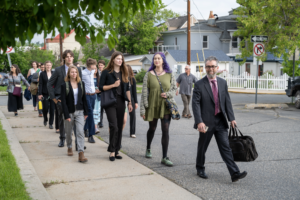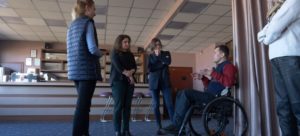With daily radio reports in English and weekly updates in Hmong, Somali and Spanish, Racial Reckoning: The Arc of Justice project features trial coverage with an ‘unfiltered approach to amplifying community voices.’
KMOJ-FM, the Black community radio station in North Minneapolis known as “The People’s Station,” has given voice to communities of color since its founding in 1976. It offers 70 hours of public affairs program a week, staffed by earnest volunteers with little to no professional journalism training.
Though it runs national news from the Black Information Network (BIN), the station has no local news director or news department. So when something big happens in Minnesota, like the Derek Chauvin murder trial, there’s not much general manager Freddie Bell can do. “With everything else I do in a given day, I can’t cover the events and also manage a radio station,” said Bell, who also co-hosts the KMOJ morning show.
Late last year, Bell lamented this to Joel Glaser, chief executive officer of The Association of Minnesota Public Educational Radio Stations (Ampers), which supports KMOJ and seventeen more community radio stations throughout the state. Ampers raises money to maintain these stations in underserved communities.
“(Bell) expressed to me he was disappointed and frustrated being a smaller community station, lacking the resources to truly cover the events of last year around George Floyd and everything that followed,” Glaser said.
At first, Glaser considered any remedy too big and costly for Ampers to take on. Then he thought a little deeper. How could an organization with the tagline Diverse Radio for Minnesota’s Communities ignore the biggest story affecting those communities in decades?
So Glaser went to work raising money. In less than two months, Glaser secured funding from four large donors to launch the Racial Reckoning: The Arc of Justice project. It features a four-person team of BIPOC (Black, Indigenous, and people of color) journalists covering the trials of Chauvin and the other Minneapolis police officers, along with issues related to the death of Floyd.
With daily reports in English and weekly updates in Hmong, Somali and Spanish, Glaser says the project offers a perspective that better serves the communities its stations represent. “I’m a believer that if you’re going to do something, you need to do it right,” Glaser said.

“We talked about doing some smaller things, some programming around young adults talking about social changes, taking a step back and allowing the mainstream media to handle covering the trial because it seemed too large for us to do it.”
Ultimately, Glaser said, “our concern was that everything that was going to be taking place would really be covered through the traditional media, which meant through a predominantly white perspective, and exclusively in English. That’s not to say there aren’t BIPOC reporters, but unfortunately, there are not many BIPOC editors or executive producers. Even a BIPOC reporter out in the field, ultimately their content filters through the dominant traditional white media.”
The St. Paul and Minnesota Foundation, the Minneapolis Foundation, the McKnight Foundation and the Pohlad Family Foundation quickly came on board, fast-tracking more than $200,000 — about half what the project needs, but more than enough to get started. (The Minnesota Humanities Center also made a financial commitment.)
Glaser hired four reporters and producers of color: Georgia Fort, a two-time Emmy nominated TV and multimedia journalist; reporters Samantha HoangLong and Feven Gerezgiher; and associate producer Chioma Uwagwu. The latter three are products of the ThreeSixty Journalism program at the University of St. Thomas.
Former Minnesota Public Radio arts reporter Marianne Combs, who is white, serves as managing news editor. But the coverage is collaborative, with BIPOC voices front and center.
“We set out to at least offer up a different narrative,” Glaser said. “It was very interesting for me the first day of jury selection to listen to what our reporters put together, then watch what was on a couple of local TV stations and see what else was out there. I’m not saying one is right and one is wrong. But they were very different reports, in large part because they were coming from very different perspectives.”
Fort, a St. Paul native and St. Thomas grad who previously worked at TV stations in Duluth and Columbus, Ga., was already interviewing mothers of Black men and women killed by police for an independent story when she joined Racial Reckoning. (The piece, for the Twin Cities non-profit media platform Unicorn Riot, is still in production.) Credentialed to cover the Chauvin trial, Fort served as a pool reporter on March 23, the final day of jury selection.
Her institutional knowledge and community connections give her access to more people and places than many reporters covering the trial. Besides contributing to the daily radio reports, Fort produces videos on her website and Facebook page. Two video interviews, with a nine-year-old girl who testified at the trial and another with a friend of Floyd’s, are especially powerful.
“This has allowed me to have an unfiltered approach to amplifying community voices,” Fort said. “I don’t have a white-led corporation filtering and editing. I’m not saying every organization is like that, but that is the perception a lot of communities have now of mainstream media, because of things that historically haven’t gone well when communities’ of color stories are being told.”
Glaser hopes to secure enough funding to keep the Racial Reckoning team on permanently, looking deeper into criminal justice reform, community healing, health care, housing and jobs.
“It’s unusual in news to have a mission,” Glaser said. “Our mission is to have the absent and the ignored voices be heard, but also to start a dialog about what needs to change for a more just society. So it is a news project, but also kind of a social equity project as well.”
Bell has been thrilled with the coverage, which airs on KMOJ at 7:30 a.m., 11:30 a.m., 3:30 p.m. and 5 p.m. “It’s what I expected, but it’s much more than that,” he said. “I thought I was going to get a narrative of a person just reporting, but we are going deeper than that. We’re uncovering the community organizers, the attorneys, the police officers. It’s everything you would expect and more from a newsroom.”
So what do KMOJ listeners think?
Bell said he’s gotten two calls about the coverage, both positive. The second left a brief message that Bell took in the best possible way: It’s about time.
“I just smiled,” he said.




